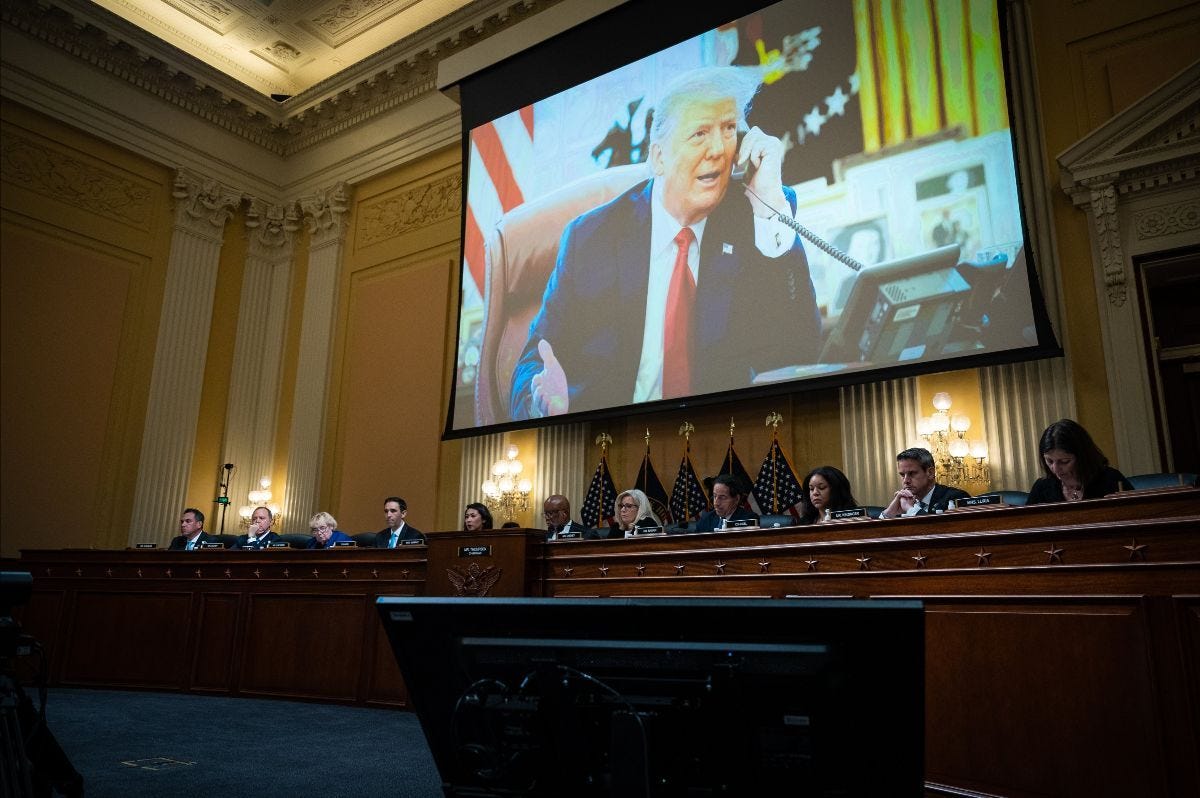How the House and Senate electoral reform bills compare
Wake Up To Politics: Comparing the House, Senate electoral reform bills
by Gabe Fleisher
Good morning! It’s Wednesday, September 21, 2022. Election Day 2022 is 48 days away. Election Day 2024 is 776 days away.
How the House and Senate electoral reform bills compare
The House is expected to vote today on the Presidential Election Reform Act, a new bill by Reps. Liz Cheney (R-WY) and Zoe Lofgren (D-CA) to update the infamous Electoral Count Act (ECA) of 1887.
Inspired by the tumultuous 1876 presidential election, the 19th-century law governs the post-presidential election process and the congressional certification of electoral votes that takes place quadrennially on January 6.
However, the ECA is notoriously arcane and poorly written; most recently, of course, former President Trump and his allies attempted to take advantage of the law’s shortcomings to overturn his 2020 loss at the Electoral College certification on January 6, 2021.
If this is sounding familiar, that’s because the Cheney-Lofgren bill is the second bipartisan effort to reform the ECA that’s emerged in recent months. Back in July, I wrote about a bipartisan Senate bill, the Electoral Count Reform and Presidential Transition Improvement Act, with the same objective.
Later in this newsletter, I want to get into the odds each bill has of passing. But we can’t do that without first taking a look at the bills themselves.
So let’s dive into the texts of each and examine how the House and Senate proposals compare to one another. If you want to follow along, you can read the 38-page House bill here and the 35-page Senate bill here.
Where they overlap:
➞ Both bills clarify that the vice president’s role at the January 6 certification is merely “ministerial,” contrary to Trump’s interpretation of the ECA.
➞ Both bills require states to appoint electors in accordance with the laws they enacted prior to Election Day, preventing a state legislature from suddenly declaring after the election that they will determine the electors instead of the voters.
➞ Both bills mandate that the elector slate submitted by a state’s governor be treated as “conclusive,” precluding lawmakers from considering other slates sent in by competing state officials.
➞ Both bills create a fast track for legal challenges to a presidential election by one of the candidates, calling for a three-judge panel and then an expedited path to the Supreme Court.
Where they differ:
➞ The bills set different thresholds for how many members of Congress need to object to a state’s electoral votes to force a vote on them during the January 6 session. The Senate bill requires one-fifth of each chamber to object; the House bill goes farther, requiring one-third of each chamber. (Currently, objections from just one member of each chamber trigger a vote.)
➞ The House bill also lays out the specific reasons a lawmaker can object to a state’s elector slate. Each of the grounds for objection is fairly obscure: that a state wasn’t a state at the time of the election, that a state submitted too many electoral votes, that one of the state’s electors is ineligible, or that the candidate the state voted for is ineligible. You’ll notice none of the grounds for objection mention “voter fraud.” The Senate bill, like current law, does not set any restrictions for lawmakers objecting to electoral votes on January 6.
➞ The bills have different language around the type of “catastrophic events” that could allow a state to postpone Election Day. The Senate bill lets the states define catastrophe, as long as they follow their previously enacted laws. The House bill makes clear that a “catastrophic event” is limited to a “major natural disaster, an act of terrorism, or a widespread power outage.” (Currently, the ECA allows state legislatures to declare there was a “failed election,” without doing anything to specify what that entails.)
➞ The House bill has a provision that prohibits election officials from refusing to count, report, or certify their state’s election results. If a governor refuses to send the state’s electoral votes to Congress, a court can order “another official of the state” to do it. The Senate bill has no language concerning officials refusing to certify results.
But there’s also one more difference between the two bills that needs to be addressed: The Senate measure has more expansive bipartisan support.
Just this morning, Sens. Susan Collins (R-ME) and Joe Manchin (D-WV) — the lead authors of the Senate bill — formally announced that their proposal is supported by ten Senate Republicans. That’s the threshold it would need to avert a Senate filibuster and advance through the upper chamber.
The House bill, on the other hand, is expected to attract thin GOP support during today’s vote. (House Republican leadership is whipping against the proposal.) As is sometimes the case on Capitol Hill, a lot of that comes down to who is behind it, not necessarily what is in it.
“It’s clear that anything Liz Cheney touches is all about whacking Donald Trump and not about making meaningful changes,” Rep. Jim Banks (R-IN), an influential lawmaker, told Axios.
A senior Republican aide was even blunter when speaking to the news outlet: GOP opposition to the bill is “not about the substance,” they said. “It’s...strictly personality.”
Cheney, of course, is persona non grata in the GOP after emerging as Trump’s fiercest critic within the party. She and Lofgren both serve on the House January 6th committee, another strike against them in Republican circles, and their proposal is expected to be part of the panel’s suite of legislative recommendations in its final report.
If their proposal doesn’t have 10 GOP supporters in the Senate, and the Collins-Manchin bills does, then that’s the ballgame.
However, it’s also possible that the two bills eventually merge to some degree. The next date to watch is September 27, when the Senate Rules Committee is set to debate the Collins-Manchin proposal.
Cheney told reporters Tuesday that amendments will be proposed in committee that “reflect some of the places where there are differences between the two bills,” making it possible that the Senate version is eventually pushed closer to the House one.
In any event, don’t necessarily expect a Senate vote on ECA reform any time soon. Per NBC News, most lawmakers currently expect a final vote to be pushed to the “lame duck session” — the period between Election Day and when the new Congress is sworn in.
What else you should know
➞ Russian president Vladimir Putin announced a partial military mobiliazation this morning, signaling plans to draft as many as 300,000 reservists into service in Ukraine. It’s the first time Russia has made such a mobilization since World War II.
The U.S. ambassador to Ukraine called Putin’s speech, which also included a veiled nuclear threat, a sign of “weakness.”
➞ The special master in the Trump documents case appeared skeptical of the former president's legal arguments during a Tuesday hearing. “You can’t have your cake and eat it,” he told Trump’s lawyers at one point.
The special master was appointed at Trump’s request, and the individual chosen — federal judge Raymond Dearie — was proposed by Trump for the role.
➞ A group of migrants transported from Texas to Martha’s Vineyard, Massachusetts by Florida Gov. Ron DeSantis’ administration has filed a class action lawsuit against DeSantis.
DeSantis’ action is also under criminal investigation by a sheriff in Texas.
Today at a glance
All times Eastern. Click on an event’s time to watch it.
White House
➞ President Biden is in New York City for the 77th annual United Nations General Assembly. He will deliver remarks to the UN (10:35 am), meet with UN Secretary-General António Guterres (11:45 am), meet with UK Prime Minister Liz Truss (1:15 pm), deliver remarks at the Global Fund’s Seventh Replenishment Conference (4 pm), and host a reception for visiting world leaders (7 pm).
➞ Vice President Harris will attend a “Service of Thanksgiving for the Life of Her Late Majesty Queen Elizabeth II” at Washington National Cathedral (11 am) and deliver remarks on a press call on Emergency Capital Investment Program (ECIP) investments (2:15 pm).
➞ First Lady Biden is also in New York. She will join Queen Letizia of Spain for a visit to Columbia University Irving Medical Center highlighting cancer research (12:15 pm), deliver remarks at the Concordia Annual Summit (2:15 pm), and join her husband in hosting the world leaders reception (7 pm).
Congress
➞ The Senate will convene (10 am) and resume consideration of the Kigali Amendment, an addition to the Montreal Protocol, a 1987 climate treaty. The amendment would commit the U.S. to phasing down its production and use of hydrofluorocarbons (HFCs) by 85% over the next 15 years.
HFCs, which are used in many air conditioners and refrigerators, are an even bigger contributor to climate change than carbon dioxide. The chamber is likely to vote on Kigali today; like all treaties, it will require support from two-thirds of the Senate, or 67 senators. The treaty advanced with 64 votes on Tuesday, but if the three Democrats who were absent yesterday join, it should be ratified.
➞ The House will convene (10 am) and consider two pieces of legislation: the Presidential Election Reform Act and the Joint Consolidation Loan Separation Act. Final votes are likely on both bills today.
The former is the update to the Electoral Count Act of 1887 authored by Reps. Zoe Lofgren (D-CA) and Liz Cheney (R-WY). The measure would clarify the vice president’s role in counting electoral votes, raise the threshold for lawmakers objecting to electors, and prevent states from retroactively changing their election laws after Election Day.
The latter is a Senate-passed bill that will allow divorce couples who consolidated their federal student loan debt while married to separate their debt back into two loans, which is currently impossible. If approved by the House, the measure will go to President Biden’s desk.
Courts
➞ The Supreme Court is out until September 28.
Economy
➞ Federal Reserve Chair Jerome Powell will hold a press conference (2:30 pm) after a meeting with key Fed officials. He is expected to announce a three-quarter point interest rate hike, the third this year.
In the States
➞ New York Attorney General Letitia James will hold a press conference to make a “major announcement” (10:30 am).
Before I go...
Here’s something interesting: A group of scientists has produced a new estimate for how many ants are living on Earth. The answer is hard to wrap your mind around.
Their estimate was 20,000,000,000,000,000 ants — that’s 20 quadrillion.
“It’s unimaginable,” a lead author on the study told the Washington Post. “We simply cannot imagine 20 quadrillion ants in one pile, for example. It just doesn’t work.”
For every person on Earth, the Post noted, there are about 2.5 million ants. “It’s the ants’ world,” the article added, “and we’re just visiting.”
Read more from the Washington Post.
That’s it for today. If you enjoy Wake Up To Politics, it’s always appreciated if you donate to support the newsletter or buy some merch. Or if you tell your friends and family to sign up at wakeuptopolitics.com.
If you have any questions or feedback, feel free to email me: my inbox is always open.
Thanks for waking up to politics! Have a great day.
— Gabe







